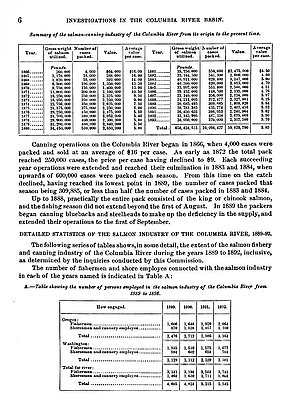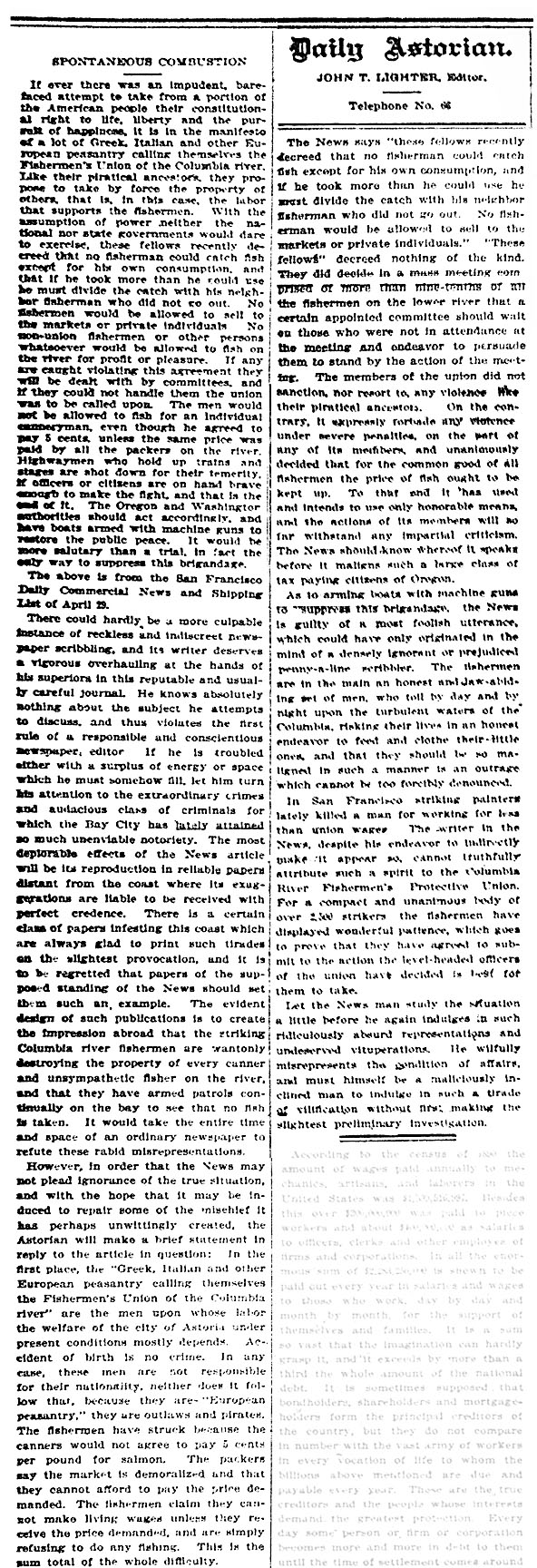- Catalog No. —
- Daily Morning Astorian, May 5, 1896
- Date —
- May 5, 1896
- Era —
- 1881-1920 (Industrialization and Progressive Reform)
- Themes —
- Government, Law, and Politics, Labor, Trade, Business, Industry, and the Economy
- Credits —
- Oregon Historical Society
- Regions —
- Coast Columbia River
- Author —
- John T. Lighter, Editor
News Article, Spontaneous Combustion
This editorial was published in the Daily Morning Astorian on May 5, 1896. It is a response by John T. Lighter, the editor of the Daily Morning Astorian, to an opinion piece on the 1896 lower Columbia River fishermen’s strike published in San Francisco’s Daily Commercial News and Shipping List.
The gillnetters of the lower Columbia River organized the Columbia River Fishermen’s Protective Union (CRFPU) in 1879. By 1890 the union had approximately 2,500 members, about 40 percent of whom were foreign-born. Most of the foreign-born members came from Sweden, Norway, Finland, and Denmark. Austrians, Germans, Slavs, British, and Canadians made up most of the rest of the foreign-born union members. Although Astoria had one of the largest Chinese communities in Oregon, Chinese were excluded from the fishery and were employed only in the canneries.
Fishermen organized several strikes in the late nineteenth century, the most important of which was the strike of 1896. Lower-river gillnetters went on strike in April of that year when the canneries cut the price they were willing to pay for fish. The Daily Morning Astorian was fairly sympathetic to the striking workers, as were many local residents and businesses. The fish trap owners of Chinook, Washington, also came out in support of the gillnetters, though the trapmen of Ilwaco, Washington, long-time opponents of the gillnetters, convinced the governor of Washington to send national guard troops to protect them against the striking fishermen.
Despite the local support, many newspapers from outside the area were highly critical of the strike. The Roseburg Plaindealer, for example, referred to the strikers as “ignorant, vicious and anarchistic hordes from Europe,” a sentiment echoed in the document reproduced above. The writer accuses the fishermen, whom he calls “European peasantry,” of threatening Americans’ rights to “life, liberty and the pursuit of happiness.” He recommends that gunboats be sent to quell the unrest, a suggestion the editor of the Daily Morning Astorian considered to be “a most foolish utterance, which could only have originated in the mind of a densely ignorant or prejudiced penny-a-line scribbler.”
The following month, however, the governor of Oregon did deploy gunboats to the area, manned by national guardsmen. They were sent to Astoria after several violent clashes between union and non-union fishermen, one of which resulted in the death of a non-union gillnetter. The strike ended soon after the arrival of the guard when the canneries and the union agreed on a compromise price.
Further Reading:
Martin, Irene. Legacy and Testament: The Story of Columbia River Gillnetters. Pullman, Wash., 1994.
Smith, Courtland L. Salmon Fishers of the Columbia. Corvallis, Oreg., 1979.
Written by Cain Allen, © Oregon Historical Society, 2006
Related Historical Records
-
Protect the Salmon - Vote 332 (X) Yes
This card was distributed by the Fish Conservation Committee, a political group organized to promote a 1908 initiative that sought to ban fishwheels and other forms of commercial salmon …

-
Advertisements, Salmon Fishery Initiatives, 1908
These two advertisements were published in the spring of 1908. The first document, titled “Your Vote is Necessary to Preserve the Salmon Industry,” represents the views of lower …

-
Salmon Decline, 1894
This document is an excerpt from an 1894 report by the U.S. Commissioner of Fish and Fisheries Marshall McDonald. It describes the decline of salmon in the headwaters of …

